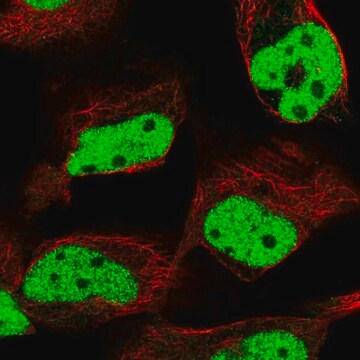M8320
Anti-MLH1 (N-terminal) antibody produced in rabbit
~1 mg/mL, affinity isolated antibody, buffered aqueous solution
Sinônimo(s):
Anti-COCA2, Anti-FCC2, Anti-HNPCC, Anti-MGC5172
About This Item
Produtos recomendados
fonte biológica
rabbit
conjugado
unconjugated
forma do anticorpo
affinity isolated antibody
tipo de produto de anticorpo
primary antibodies
clone
polyclonal
forma
buffered aqueous solution
peso molecular
antigen 80-85 kDa
reatividade de espécies
rat, human, mouse
embalagem
antibody small pack of 25 μL
concentração
~1 mg/mL
técnica(s)
immunocytochemistry: 2.5-5 μg/mL using MCF7 cells fixed with paraformaldehyde-Triton
immunoprecipitation (IP): 5-10 μg using Jurkat cell lysates
western blot: 0.5-1 μg/mL using Jurkat cell lysates
nº de adesão UniProt
Condições de expedição
dry ice
temperatura de armazenamento
−20°C
modificação pós-traducional do alvo
unmodified
Informações sobre genes
human ... MLH1(4292)
mouse ... Mlh1(17350)
rat ... Mlh1(81685)
Descrição geral
Imunogênio
Aplicação
- Anti-MLH1 (N-terminal) antibody produced in rabbit has been used in:
- immunoblotting
- immunoprecipitation
- immunocytochemistry
Ações bioquímicas/fisiológicas
Descrição-alvo
forma física
Exoneração de responsabilidade
Not finding the right product?
Try our Ferramenta de seleção de produtos.
produto relacionado
Código de classe de armazenamento
10 - Combustible liquids
Classe de risco de água (WGK)
WGK 3
Ponto de fulgor (°F)
Not applicable
Ponto de fulgor (°C)
Not applicable
Equipamento de proteção individual
Eyeshields, Gloves, multi-purpose combination respirator cartridge (US)
Certificados de análise (COA)
Busque Certificados de análise (COA) digitando o Número do Lote do produto. Os números de lote e remessa podem ser encontrados no rótulo de um produto após a palavra “Lot” ou “Batch”.
Já possui este produto?
Encontre a documentação dos produtos que você adquiriu recentemente na biblioteca de documentos.
Nossa equipe de cientistas tem experiência em todas as áreas de pesquisa, incluindo Life Sciences, ciência de materiais, síntese química, cromatografia, química analítica e muitas outras.
Entre em contato com a assistência técnica







